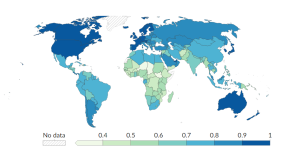4.9 GDP and Human Happiness
More GDP cannot necessarily be equated with more human happiness. But more GDP does mean more of the goods and services we measure. It means more jobs. It means more income. And most people seem to place a high value on these things. But as we mentioned before, GDP has its faults because it includes only goods and services that can be bought or sold in the marketplace, as discussed in section 4.3 shortcomings of GDP. GDP does measure the production of most goods and services. And goods and services get produced, for the most part, because we want them. We might thus be safe in giving two cheers for GDP—and holding back the third in recognition of the conceptual difficulties inherent in using a single number to summarize the output of an entire economy.
Rather than using GDP, another measure called GDP per capita may be a relatively better indicator of human happiness because GDP per capita implies the economic output produced per person. In other words, it is the average income a person in the country earns. We measure it by dividing real GDP by the country’s population. Although happiness is not tied to income entirely, earnings do determine a person’s well-being to a certain extent. We will discuss GDP per capita in more detail in the subsequent chapters.
The Human Development Index (HDI) constructed by the United Nations is a more comprehensive measure of human well-being because it includes factors that GDP fails to consider, such as access to education measured by years of schooling, life expectancy at birth, mortality rates, social justice and political freedom.
Interactive Tool: Human Development Index
Attribution
“6.3 GDP and Economic Well-Being” from Principles of Macroeconomics by University of Minnesota is licensed under a Creative Commons Attribution-NonCommercial-ShareAlike 4.0 International License, except where otherwise noted.


